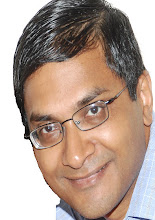I love Carnatic
classical music. I took to it 20 years ago and there has been no
turning back. During the early days I liked a few of the ragas like,
Mohanam, Hamsadhvani, Kaanada, Kambodhi, and Kaapi. Later I learned to
enjoy a whole host of other Ragams such as Shankarabharanam,
Karaharapriya, Sriranjani, Khamas, and Panthu Varali to name
just a few.
A large number of listeners predominantly derive pleasure from the peotry. Carnatic music is predominantly Kriti based, which means, the artist performs songs that are poems written and then set to music by the four Trinity of Carnatic Music (yes, I know what trinity means), Muthusvamy Dikshithar, Shyama Shastry, Purandara Dasa, and of course the saint Thyagaraja. Or else they choose lyrics from popular religious text. The most popular songs are almost always poems written in Telugu, Sanskrit, or Kannada. A lot of the songs are so well known that you see frequently audience requesting them by the first two words of the poem.
I am not a language bigot and I speak three quite fluently and two others that I could pick up with little effort. It is just that, these composers were deeply religious. Thyagaraja was famous for his Rama Bhakti, Shyama Shastri composed so many songs in praise of Devi. Dikshithar went on a pilgrimage around India writing peoms in praise of various deities all over the country. Purandara Dasa gave up a life of affluence to sing praise of the Lord. Since you all know my opinion on both God and religion; it would not come as a surprise when I say that these poems do not move me at all. I cannot go into ecstasy listening to how Thyagaraja chides Rama for not meeting him in the eye. Whatever dude!
And therein comes the title. I initially thought of titling this post "Tyranny of Kritis". My daughter is studying for AP Literature and from her I learned the meaning of alliteration. I immediately saw that I must change the title. I assure you I have nothing against Thyagaraja.
Coming back to my love for the music, thankfully I persevered and during this time, found myself developing a predilection for the the Alapana, Neraval, Svara Kalpana. These aspects of Carnatic Music, also known as, Manodharma, help the audience appreciate the creativeness of the artists and their ability to improvise or bring originality to a given set piece.
A large number of listeners predominantly derive pleasure from the peotry. Carnatic music is predominantly Kriti based, which means, the artist performs songs that are poems written and then set to music by the four Trinity of Carnatic Music (yes, I know what trinity means), Muthusvamy Dikshithar, Shyama Shastry, Purandara Dasa, and of course the saint Thyagaraja. Or else they choose lyrics from popular religious text. The most popular songs are almost always poems written in Telugu, Sanskrit, or Kannada. A lot of the songs are so well known that you see frequently audience requesting them by the first two words of the poem.
I am not a language bigot and I speak three quite fluently and two others that I could pick up with little effort. It is just that, these composers were deeply religious. Thyagaraja was famous for his Rama Bhakti, Shyama Shastri composed so many songs in praise of Devi. Dikshithar went on a pilgrimage around India writing peoms in praise of various deities all over the country. Purandara Dasa gave up a life of affluence to sing praise of the Lord. Since you all know my opinion on both God and religion; it would not come as a surprise when I say that these poems do not move me at all. I cannot go into ecstasy listening to how Thyagaraja chides Rama for not meeting him in the eye. Whatever dude!
And therein comes the title. I initially thought of titling this post "Tyranny of Kritis". My daughter is studying for AP Literature and from her I learned the meaning of alliteration. I immediately saw that I must change the title. I assure you I have nothing against Thyagaraja.
Coming back to my love for the music, thankfully I persevered and during this time, found myself developing a predilection for the the Alapana, Neraval, Svara Kalpana. These aspects of Carnatic Music, also known as, Manodharma, help the audience appreciate the creativeness of the artists and their ability to improvise or bring originality to a given set piece.

No comments:
Post a Comment